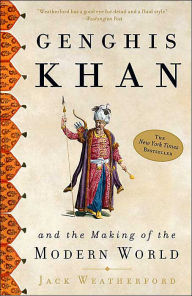
This was another Audio Book on my road trip, which took me through the New England portions of the drive and into Canada today.
The strength of this book is the incredible wealth of research Weatherford compiled. It is literally the product of decades of both primary and secondary research, as well as extensive on-site examinations of the region where Genghis Khan lived, fought, and ruled.
But that also happens to be one of my qualms with the book. In the first quarter of the book, Weatherford gives us a fascinating narrative history of Genghis’s rise to power from obscurity and it is truly a riveting tale. But then the book changes character entirely and becomes an encyclopedic account of all the changes in the world that came from the rise of the Mongol Empire. Don’t get me wrong; it’s a look at world history that has long been mistold and distorted, chiefly by figures in countries that were conquered by Genghis (or his sons and grandsons). And setting the record straight is valuable. But the narrative feel of the book disappeared and I missed it.
When Genghis dies the book felt over to me. In reality, it was only half over. And the story of Genghis’s descendants–while important–was not nearly as fascinating and felt to me that it belonged in a separate work.
As I said, I’m overwhelmed with the level of impressive research Weatherford’s team compiled, but the sheer volume of arcane material in the second half of the book killed my interest as it went on and on. It’s as if Weatherford had all of the research, and by god, it’s all going in this book, even if it cripples the narrative history.
It’s not exactly the kind of story Erik Larson covers in his micro-histories, but I would have been interested to see how he would have told the same story. Nevertheless, I’m glad to have a lot of the cultural myths about Genghis and the Mongols set straight for me.
The strength of this book is the incredible wealth of research Weatherford compiled. It is literally the product of decades of both primary and secondary research, as well as extensive on-site examinations of the region where Genghis Khan lived, fought, and ruled.
But that also happens to be one of my qualms with the book. In the first quarter of the book, Weatherford gives us a fascinating narrative history of Genghis’s rise to power from obscurity and it is truly a riveting tale. But then the book changes character entirely and becomes an encyclopedic account of all the changes in the world that came from the rise of the Mongol Empire. Don’t get me wrong; it’s a look at world history that has long been mistold and distorted, chiefly by figures in countries that were conquered by Genghis (or his sons and grandsons). And setting the record straight is valuable. But the narrative feel of the book disappeared and I missed it.
When Genghis dies the book felt over to me. In reality, it was only half over. And the story of Genghis’s descendants–while important–was not nearly as fascinating and felt to me that it belonged in a separate work.
As I said, I’m overwhelmed with the level of impressive research Weatherford’s team compiled, but the sheer volume of arcane material in the second half of the book killed my interest as it went on and on. It’s as if Weatherford had all of the research, and by god, it’s all going in this book, even if it cripples the narrative history.
It’s not exactly the kind of story Erik Larson covers in his micro-histories, but I would have been interested to see how he would have told the same story. Nevertheless, I’m glad to have a lot of the cultural myths about Genghis and the Mongols set straight for me.
 RSS Feed
RSS Feed
